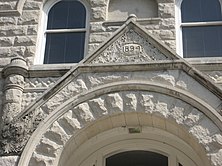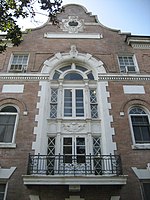Tulane University School of Medicine
 | |
| Type | Private |
|---|---|
| Established | 1834 |
| Dean | Benjamin Sachs |
Academic staff | 309 (full-time), 1,289 (part-time) |
| Students | 640 |
| Location | , , |
| Campus | Urban |
| Website | http://www.som.tulane.edu/ |
The Tulane University School of Medicine is located in New Orleans, Louisiana, USA and is a part of Tulane University. The school is located in the Medical District of the New Orleans Central Business District.
History

The school was founded in 1834 as the Medical College of Louisiana and is the 15th oldest medical school in the United States and the 2nd oldest in the deep south. The first classes were held in 1835 at a variety of locations, including Charity Hospital and the Strangers Unitarian Church. The first permanent building for the school was constructed in the French Quarter in 1844. In 1893, the school moved to Canal Street in the Richardson building, and then shortly after to the Hutchison Building, also on Canal. Finally, in 1930, the school moved to its current location -- the Hutchinson Memorial Building -- on Tulane Avenue, next to Charity Hospital.[1]
The school has highly competitive admissions, accepting only 175 medical students from more than 9,000 applications. About 40 percent of the students in each class are concurrently enrolled as candidates for the master of public health degree in the School of Public Health and Tropical Medicine. It is estimated that Tulane University has graduated more than 40 percent of all physicians in the U.S. who have earned both M.D. and master of public health degrees.
In 2001 the Tulane Center for Gene Therapy started as the first major center in the U.S. to focus on research using adult stem cells.
Today, the medical school is but one part of the Tulane University Health Sciences Center, which includes the School of Medicine, the Tulane University Hospital and Clinic, the School of Public Health and Tropical Medicine, the University Health Service, the Tulane National Primate Research Center, the U.S.-Japan Biomedical Research Laboratories, and the Tulane/Xavier Center for Bioenvironmental Research. Most components of the Health Sciences Center are located in the heart of New Orleans, in the medical district that comprises Tulane facilities and the LSU/Charity Hospital center just north of the New Orleans Central Business District. It comprises 20 academic departments: Anesthesiology, Biochemistry, Family and Community Medicine, Medicine, Microbiology and Immunology, Neurosurgery, Obstetrics and Gynecology, Ophthalmology, Orthopaedics, Otolaryngology, Pathology and Laboratory Medicine, Pediatrics, Pharmacology, Physiology, Psychiatry and Neurology, Radiology, Structural and Cellular Biology, Surgery and Urology.
The school periodically hosts social events with the Tulane University Law School and the Freeman School of Business.
On August 31, 2009, Louisiana Governor Bobby Jindal along with Tulane President Scott Cowen and Louisiana State University System President John V. Lombardi approved a plan to establish both schools as board members for the future $1.2 billion University Medical Center in New Orleans.[2] The new 424-bed hospital will serve as the flagship for Tulane medical students and residents.
Notable alumni and faculty

- George E. Burch, M.D., 1933, internationally known cardiologist

Dr George E. Burch - Dr. Elizabeth Bass, M.D. 1911 one of the first women faculty at the medical school 3 years before women were allowed.[3]
- Jay Cavanaugh, Ph.D, 1994, member, California State Board of Pharmacy (1980-90), director, American Alliance for Medical Cannabis, 2001
- Michael E. DeBakey, M.D., 1932, pioneer of modern medicine and recipient of the Congressional Gold Medal
- Louis J. Ignarro, faculty (1973-1985), Nobel Prize in Physiology or Medicine (1998)
- Thomas Naum James, M.D., 1949, director, World Health Organization cardiovascular center
- Ruth Kirschstein, M.D., 1951, director, National Institutes of Health, for whom the Kirschstein NRSA grant program is named

- Leslie L. Lukash, M.D., 1944, Nassau County, NY medical examiner, inspiration for the television show Quincy, M.D. Founded National Association of Medical Examiners.
- Rudolph Matas, M.D., 1880, "father of vascular surgery"
- William Larimer Mellon, Jr., M.D., M’53, founder, Albert Schweitzer Hospital, Haiti
- Alton Ochsner, faculty, founder of Ochsner Clinic, pioneer anti-smoking advocate
- Donald J. Palmisano, M.D., A&S 1960, M 1963, President of the American Medical Association.
- Andrew V. Schally, former faculty, Nobel Prize in Physiology or Medicine (1977), French Legion of Honor
- Ross Taubman, American Podiatric Medical Association president
- Luther Leonidas Terry, M.D., 1935, U.S. surgeon general (1961 - 1965)
- Lewis Thomas, former faculty (1948-1950), physician, researcher, and essayist
- Paul Wehrle, physician who helped develop of methods to prevent and treat polio and smallpox
- Charles B. Wilson, pioneer in pituitary tumor treatment; Cushing Medal recipient'
- Paul Finger, M.D., 1982, pioneered the use of palladium-103 plaque radiation to treat choroidal melanoma and 3D and high-frequency ultrasound to image intraocular tumors.
Popular culture references
- Grey's Anatomy: Dr. Burke was a Tulane graduate.
- St. Elsewhere: Howie Mandel's character, Dr. Wayne Fiscus, attended Tulane Medical School.
Affiliations
- Tulane Medical Center
- Medical Center of Louisiana
- Ochsner Medical Center
- Veterans Affairs Medical Center.
Clinical Departments
- Department of Anesthesiology
- Department of Biochemistry
- Department of Immunology
- Department of Family and Community Medicine
- Department of Medicine
- Department of Microbiology
- Department of Neurosurgery
- Department of Obstetrics and Gynecology
- Department of Ophthalmology
- Department of Orthopaedics
- Department of Otolaryngology
- Department of Pathology and Laboratory Medicine
- Department of Pediatrics
- Department of Pharmacology
- Department of Physiology
- Department of Psychiatry and Neurology
- Department of Radiology
- Department of Structural and Cellular Biology
- Department of Surgery
- Department of Urology
Centers
- Center for Gene Therapy
- Center for Infectious Diseases
- General Clinical Research Center
- Hayward Genetics Center
- Hypertension and Renal Center
- Tulane Center for Clinical Effectiveness and Prevention (TCCEP)
- Center for Bioenvironmental Research at Tulane and Xavier Universities
Programs
- Clinical Research Curriculum Award Training Program
- Graduate Program in Biomedical Sciences
- Human Genetics Program
- Neuroscience
- Physiology
TUHC Centers of Excellence
- Depaul-Tulane Behavioral Health Center
- Tulane Cancer Center
- Tulane Center for Abdominal Transplant
- Tulane Hospital for Children
- Tulane Institute of Sports Medicine
- Tulane-Xavier National Women's Center
- Tulane Cardiovascular Center of Excellence
Notes and references
- ^ History of Tulane University School of Medicine, http://www.tulane.edu/~matas/historical/medschool/founders.htm
- ^ "Tulane University - University Medical Center moves forward". http://www.tulane.edu. Retrieved 2009-08-31.
{{cite web}}: External link in|publisher= - ^ http://www.tulane.edu/~matas/historical/SpecColl/Bass/bassindex.pdf

